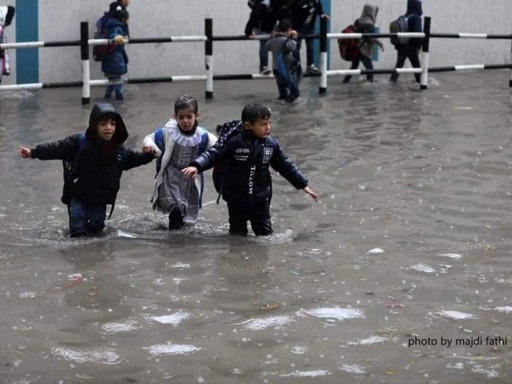As winter creeps into Gaza with its cold arrival, thousands of displaced people are enduring new chapters of suffering inside tattered tents that offer no protection from the wind or rain. After a long summer whose heat almost melted them, they now face the rainy season exposed, without cover or a floor to protect children from drowning in the mud.
In the camps stretching from the north to the south of the Gaza Strip, the fear of drowning is renewed every evening. The rain, which was once a harbinger of life, has now become a constant source of fear.
Um Mahmoud, displaced from the Zeitoun neighborhood in Gaza, told the Canary:
Our tent is torn at the sides. We put pieces of nylon over it, but the wind comes in from everywhere. With the first rain, we don’t know where we will go or how we will protect the children.
Despite repeated promises to allow the entry of relief supplies and new tents, the occupation continues to prevent their entry through the crossings, leaving families who lost their homes in the last war to face their fate in tattered tarpaulins and with water seeping into their children’s bodies.
Gaza winter: the siege exacerbates the suffering.
According to UNRWA and human rights sources, the Israeli occupation prevents the entry of tents, basic aid, and cooking gas into the Gaza Strip, despite the dire humanitarian need.
More than 1.5 million displaced people are living without adequate shelter, their tents deteriorating due to the long summer heat and frequent winds, increasing the risk of drowning and disease as winter approaches.
The Government Media Office in Gaza indicates that the restrictions on the entry of relief supplies constitute collective punishment, violating the rights of civilians under the Geneva Conventions, at a time when the camps desperately need blankets, new tents, utensils, and clothing to meet basic needs.
According to UNRWA, aid entering Gaza since the ceasefire has reached only 28% of the required amount, deepening the humanitarian needs gap and leaving thousands of displaced people without protection from the winter cold and heavy rains.
A Cry from the Camps
Abu Ahmed, displaced from the northern Gaza Strip, told the Canary:
We fear every cloud that passes overhead. This time, the rain isn’t a blessing, but a fear of drowning and freezing cold. Our tent is dilapidated, and we have no alternative.
Humanitarian organisations are calling on the international community to pressure the Israeli occupation to open the crossings and allow the immediate entry of tents and basic shelter materials, in anticipation of a potential humanitarian catastrophe with the onset of winter.
In Gaza this year, winter brings not its usual blessings, but rather knocks on the doors of worn-out tents laden with fear and hunger. Thousands of families await delayed warmth and shelter before the rains turn into a disaster.
As winter approaches, Gaza’s tattered tents remain the last refuge for the displaced, and the youngest children bear the brunt of the cold, rain, and hunger. Every day that passes without the arrival of essential aid exacerbates the suffering of families and turns winter into a test of survival.
The message is clear: life in Gaza is not just about survival, but a constant struggle for the most basic necessities. The international community must act now before the coming rains become an unstoppable humanitarian catastrophe.
Featured image via Middle East Children’s Alliance
By Alaa Shamali
From Canary via this RSS feed


